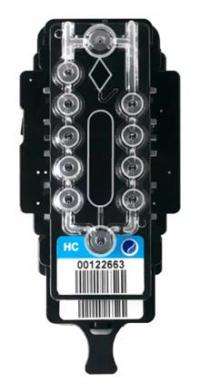December 2, 2009 weblog
Gene Testing In the Doctors Office

(PhysOrg.com) -- A portable instrument manufactured by Nanosphere Inc. and recently approved by the FDA, can detect genetic variations in blood that alter the effectiveness of some drugs.
Verigene is the first nanotechnology device that uses a combination of nanotechnology and microfluidics housed in a plastic cartridge to extract DNA from a blood sample and screen it for the relevant sequences.
People respond to drugs differently, due to the genetic variations in enzymes that metabolize some of the most common prescribed drugs. By using the Verigene device, doctors and hospitals can isolate a patient's DNA and analyze it within an hour or two. The results collected can then be used to prescribe a drug that would be most beneficial to the patient.
The technology for detecting variations in patients has been around for years but the process can take days or weeks and is very expensive. Doctors would have to send a sample of the patient's blood or saliva to a lab where the DNA is extracted and analyzed. In the meantime the doctor would prescribe medication to a patient not knowing its effectiveness until the test results return from the lab.
A patient's blood is injected into a disposable cartridge that houses a system of microfluidics chambers holding the reagents for chemical reactions. A glass slide dotted with DNA is also contained in the disposable cartridge.
Once the disposable cartridge is placed into the Verigene instrument, reagents in the chambers are mixed, triggering a series of reactions. DNA is then extracted from the white blood cells and everything else is washed away. A DNA solution passes over the glass slide and targeted DNA binds to spots on the slide that have been stamped with DNA sequences that are complementary to the target sequence. Gold nanoparticles are then sandwiched to the other end of the DNA fragments and coated with silver, allowing it to be easily detected when light hits it.
The Verigene system can also detect respiratory viruses, such as the H1N1 flu. Nanosphere has been installing their systems in medical centers, community hospitals and research centers, for the past month. The device is one of many microfluidics technologies in development for genetic testing in a doctor's office or hospital while the patient waits for the results.
More information, visit: Nanosphere Inc.
Via: Technology Review
© 2009 PhysOrg.com

















